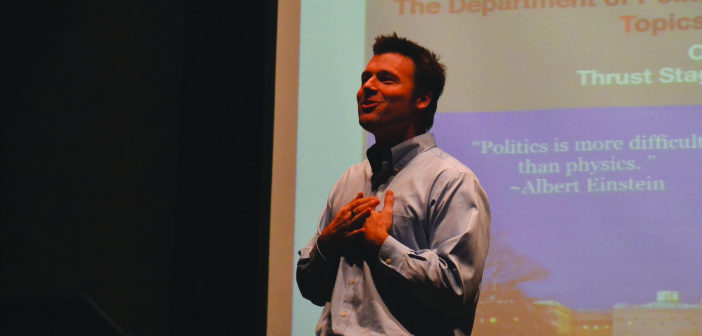Jordan Bolker
Staff Writer
Sometimes college students find it difficult to keep up with the numerous political topics that are going on throughout the world today. But thanks to the inaugural event hosted by four North Central College Political Science Department professors, the TIP talks, student attendees were better informed about the different issues that concern our international political state.
Dr. Jennifer Fredette kicked off the event by introducing to attendees Pakistan’s new, animated superhero, “Burka Avenger,” who fights for education rights, and her thesis that “superheroes (are the) projections of the ideal political world” (Fredette).
This new television show, now having 13 episodes, introduces how the superhero was taught martial arts by her foster father as a child and using those skills to save the world from tyranny and evil.
Fredette tied these videos back to the 2011 law that was passed by the French to ban the use of burqas, or scarves that Pakistani women use to cover their face except for their eyes.
Criticism erupted because of the superhero is shown to be wearing all-black clothing and a burqa that completely covers her face. Fredette explained that some of those women today find it “demeaning and that she (Burqua Avenger) was (not) only powerful when she was wearing (the burqua), and a stereotype of Pakistani countryside.”
Dr. Suzanne Chod spoke next and switched gears into her presentation about the recent government shutdown. She started with the basic facts about how this was not the first government shutdown that America had faced; we were in another one in 1996 for 21 days. She also stated that the United States has reached approximately $16.7 trillion in nation.
The she introduced the timeline of the events leading up to the shutdown. It was during September when President Obama and Congress had to agree on a budget in order to fund the government and also view the nation’s “debt-ceiling,” or how high we were in debt.
After deciding on what was believed to be an appropriate budget, the bill was sent over to the House of Representatives who approved the vote but with one condition; they proposed to defund Obamacare by writing a bill to delay the healthcare for one year.
The new bill was then sent to the all-Democrat Senate, to whom the House argued with back and forth for three days. By the end of the month, no agreement was reached and on Oct. 1, over 800,000 federal workers were sent home without any pay and the government began its first day of the shutdown.
It wasn’t until Oct. 15 that the shutdown ended but Americans today are still concerned if this will happen again in the future.
Dr. William Muck spoke after in his lecture, “Making Sense of the Arab Spring.” In 2011, Arab nations began revolutions that spread all across the Middle East, resulting in many countries’ political leaders leaving their positions.
Muck began to discuss the issue by starting with the 2011 case of Mohamed Bouazizi, a fruit vender in the country of Tunisia, who lit himself on fire in front of a government building after a government official discontinued his fruit business because he did not have the money to pay for the official’s business bribe.
This incident started many protests throughout the country until a photo taken of Tunisia’s president at the time, Zine El Ben Abidine Ben Ali, at the hospital with Bouazizi is publicly displayed. More people of Tunisia begin to protest which causes Ben Ali to flee the country. Word is spread to Egypt and creates a duplicate reaction where they protest and their president leaves.
These protesting and resignation actions become copy-cats to the countries of Yemen and Libya and when it reached Syria, the protests became violent with over 100,000 deaths and over 1 million refugees by March 2011. Twenty countries in the Middle East today are still continuing to fight and protest.
Dr. Stephen Maynard Caliendo next presented his topic of whether or not Americans live in a “post-racial United States.” The term “post-racial,” is defined as whether or not the United States is innocent of racism, discrimination, and prejudice toward others. The example he used to describe this term was the Zimmerman case.
In February 2012, 17-year-old African American Trayvon Martin was shot and killed outside of a townhouse in Sanford, Fla., by George Zimmerman, who called the police minutes before to report Martin as a suspicious person.
This incident stirred up a lot of controversy that Zimmerman believed Martin to be suspicious because he was African American; Zimmerman being Hispanic. After various trials and hearings, Zimmerman was found not guilty.
Caliendo introduced a research experiment done by Harvard students called the “Shooter Bias Studies” that explores the brain and the regions in which determines fear, detection, and control over our racial behavior. The experiment involved a group of teenagers coming in to play a shooter-based video game where the objective is to shoot the people who are armed and/or look dangerous and whoever got the highest score, received the most money after the study ended.
In the end, the results showed that the kinds of people that were the most often shot in the video game were those with characteristics of the stereotypical African American male (darker skin, fuller lips, and broader noses). Armed Muslims were also killed in the game just as much and women, whether black or white, were avoided most.
After explaining this study, Caliendo stated that to answer the question of whether America is “post-racial” or not is not nearly as dangerous as asking the question itself. His last slide showed a photograph of three Caucasian teenagers dressed as Martin for this year’s Halloween as a way to make students think if racism and discrimination is slowly emerging into our social norms.

